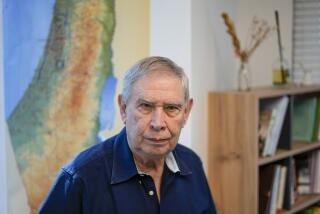Restive Egypt Calling for Change
- Share via
CAIRO, Egypt — The rally in September was supposed to be in support of the Palestinians. But then a few demonstrators veered off the script and turned their wrath on their own leaders, who “are wearing the latest fashions, and we are sleeping 10 in one room.”
It wasn’t the first time this has occurred in firmly policed Egypt. In April, protesters against the war in Iraq switched to personal attacks on President Hosni Mubarak. And the month before that they yelled “Down with Mubarak! No to Gamal Mubarak inheriting power!” -- referring to suspicions that Mubarak is grooming his son as his successor.
Their numbers may be small, but anyone daring enough to criticize the government gets noticed -- and sometimes arrested. The protesters are evidence of the pressures that have led leaders of the Arab world’s most populous country -- a valued U.S. ally and critical player in the Arab-Israeli peace effort -- to at least talk about political and economic reform.
Another sobering sign of the times: In a country whose worst riots have been touched off by price hikes and food shortages, bakeries don’t have enough bread to go around.
Mubarak has offered an impressive-sounding package of political and economic reforms, but they are short on substance.
“Are we moving into qualitative change? The answer is no,” said Abdel Moneim Said, director of the Cairo-based Al Ahram Center for Political and Strategic Studies.
Said has long called on the government to snap out of its socialist mind-set. He believes economic reforms and privatization could create a middle class that would push for political reform.
The need for reform has got attention in the Middle East after the Sept. 11 attacks, the U.S.-led war in Iraq and the U.S. administration’s stated determination to see change throughout a region dominated by dynasties and presidents for life.
“Without a transformation of the Middle East, the region will remain a source of violence and terrorism, fueled by poverty, by alienation and by despair,” U.S. Secretary of State Colin Powell said in September.
Such outside pressure has emboldened Egyptians who want change, said Saad Eddin Ibrahim, one of the few Arab intellectuals to go against the grain by articulating the positive side of Saddam Hussein’s ouster.
Mubarak, 75 and in power since 1981, has to tread carefully. His predecessor, Anwar Sadat, was assassinated by Islamic fundamentalists, and religious violence, fueled by chronic poverty and 20% joblessness, racked the country of 70 million during the 1990s.
At the September congress of his National Democratic Party, Mubarak vowed to abolish Egypt’s more repressive legal measures, and he endorsed a package of reforms drafted by a party committee headed by his son. These would touch on most areas of life in Egypt. Reformers say they’ll believe it when they see it.
Gamal Mubarak, 39, is business- and technology-savvy, advocates change and champions the Internet. Some Egyptians indeed are using the Web to bypass old political channels, but they haven’t embraced Mubarak Jr. Instead, they fret that Egypt would be going the way of undemocratic Syria and several Arab monarchies if power passed from father to son.
“The real problem is not lack of good intentions or new ideas, but in the prevailing mentality,” said Rifaat El-Said, secretary general of the leftist opposition Tagammu party. “There is still the concept of the master party that owns the country.”
On the other hand, Ibrahim, the sociologist, says he’s optimistic about the proposed reforms and other recent measures, including the release of Gamaa al Islamiya leader Karam Zohdy, who was jailed in connection with Sadat’s assassination and later renounced violence.
The moves “are not cosmetic, but symbolic,” said Ibrahim, who was jailed because of his human rights work but won acquittal in March and has since been left alone.
He believes the regime cannot solve Egypt’s economic problems and its only room for maneuver is “the political front, to which it [has] introduced some positive change.”
More to Read
Sign up for Essential California
The most important California stories and recommendations in your inbox every morning.
You may occasionally receive promotional content from the Los Angeles Times.












